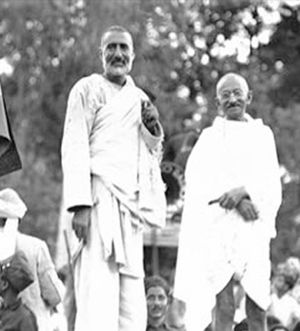भारत के विभाजन का विरोध


२०वीं शताब्दी में भारत के विभाजन का व्यापक विरोध हुआ था और अब भी यह दक्षिण एशियाई राजनीति में चर्चा का विषय बना हुआ है। जो लोग इसका विरोध करते थे वे अक्सर मिश्रित राष्ट्रवाद के सिद्धान्त को मानते थे। [3] हिंदू, ईसाई, एंग्लो-इंडियन, पारसी और सिख समुदाय बड़े पैमाने पर भारत के विभाजन (और इसके अंतर्निहित दो-राष्ट्र सिद्धांत ) के [4] [5] [6] [7] के विरोधी थे। इनके साथ ही बहुत से मुसलमान भी भारत विभाजन के विरोधी थे और ये लोग अखिल भारतीय आजाद मुस्लिम सम्मेलन से समर्थक थे।)। [8] [9] [10]
सन्दर्भ[संपादित करें]
- ↑ Samuel Totten (2018). Dirty Hands and Vicious Deeds: The US Government's Complicity in Crimes against Humanity and Genocide (अंग्रेज़ी में). University of Toronto Press. आई॰ऍस॰बी॰ऍन॰ 9781442635272.
- ↑ Majmudar, Uma (2012). Gandhi's Pilgrimage of Faith: From Darkness to Light (अंग्रेज़ी में). SUNY Press. आई॰ऍस॰बी॰ऍन॰ 9780791483510.
- ↑ Na, Abdullahi Ahmed An-Na'im; Naʻīm, ʻAbd Allāh Aḥmad (2009). Islam and the Secular State (अंग्रेज़ी में). Harvard University Press. पृ॰ 156. आई॰ऍस॰बी॰ऍन॰ 978-0-674-03376-4.
The Jamiya-i-ulama-Hind founded in 1919, strongly opposed partition in the 1940s and was committed to composite nationalism.
- ↑ Shaw, Jeffrey M.; Demy, Timothy J. (2017). War and Religion: An Encyclopedia of Faith and Conflict [3 volumes] (अंग्रेज़ी में). ABC-CLIO. पृ॰ 371. आई॰ऍस॰बी॰ऍन॰ 9781610695176.
Upon the assurances of the Congress Party that Sikh interests would be respected as an independent India, Sikh leadership agreed to support the Congress Party and its vision of a united India rather than seeking a separate state. When Partition was announced by the British in 1946, Sikhs were considered a Hindu sect for Partition purposes. They violently opposed the creation of Pakistan since historically Sikh territories and cities were included in the new Muslim homeland.
- ↑ Thomas, Abraham Vazhayil (1974). Christians in Secular India (अंग्रेज़ी में). Fairleigh Dickinson Univ Press. पपृ॰ 106–110. आई॰ऍस॰बी॰ऍन॰ 978-0-8386-1021-3.
- ↑ Kudaisya, Gyanesh; Yong, Tan Tai (2004). The Aftermath of Partition in South Asia (अंग्रेज़ी में). Routledge. पृ॰ 100. आई॰ऍस॰बी॰ऍन॰ 978-1-134-44048-1.
No sooner was it made public than the Sikhs launched a virulent campaign against the Lahore Resolution. Pakistan was portrayed as a possible return to an unhappy past when Sikhs were persecuted and Muslims the persecutor. Public speeches by various Sikh political leaders on the subject of Pakistan invariably raised images of atrocities committed by Muslims on Sikhs and of the martyrdom of their gurus and heroes. Reactions to the Lahore Resolution were uniformly negative and Sikh leaders of all political persuasions made it clear that Pakistan would be 'wholeheartedly resisted'. The Shiromani Akali Dal, the party with a substantial following amongst the rural Sikhs, organized several well-attended conferences in Lahore to condemn the Muslim League. Master Tara Singh, leader of the Akali Dal, declared that his party would fight Pakistan 'tooth and nail'. Not be outdone, other Sikh political organizations, rival to the Akali Dal, namely the Central Khalsa Young Men Union and the moderate and loyalist Chief Khalsa Dewan, declared in equally strong language their unequivocal opposition to the Pakistan scheme.
- ↑ Frank Anthony (1969). Britain's Betrayal in India: The Story of the Anglo-Indian Community (अंग्रेज़ी में). Allied Publishers. पृ॰ 157.
- ↑ Ashraf, Ajaz (17 August 2017). "India's Muslims and the Price of Partition". The New York Times.
Many Indian Muslims, including religious scholars, ferociously opposed the Muslim League’s demand for Pakistan.
- ↑ Ahmed, Ishtiaq (27 May 2016). "The dissenters" (अंग्रेज़ी में). The Friday Times.
However, the book is a tribute to the role of one Muslim leader who steadfastly opposed the Partition of India: the Sindhi leader Allah Bakhsh Soomro. Allah Bakhsh belonged to a landed family. He founded the Sindh People’s Party in 1934, which later came to be known as ‘Ittehad’ or ‘Unity Party’. ... Allah Bakhsh was totally opposed to the Muslim League’s demand for the creation of Pakistan through a division of India on a religious basis. Consequently, he established the Azad Muslim Conference. In its Delhi session held during April 27–30, 1940 some 1400 delegates took part. They belonged mainly to the lower castes and working class. The famous scholar of Indian Islam, Wilfred Cantwell Smith, feels that the delegates represented a ‘majority of India’s Muslims’. Among those who attended the conference were representatives of many Islamic theologians and women also took part in the deliberations.
- ↑ "Asia and the Americas". Asia and the Americas (अंग्रेज़ी में). Asia Press. 46: 212. 1946.
Many Muslim organizations are opposed to it. Every non-Muslim, whether he is a Hindu or Sikh or Christian or Parsi, is opposed to it. Essentially the sentiment in favor of partition has grown in the areas where Muslims are in a small minority, areas which, in any event, would remain undetached from the rest of India. Muslims in provinces where they are in a majority have been less influenced by it ; naturally, for they can stand on their own feet and have no reason to fear other groups. It is least evident in the Northwest Frontier Province (95 per cent Muslim) where the Pathans are brave and self-reliant and have no fear complex. Thus, oddly enough, the Muslim League's proposal to partition India finds far less response in the Muslim areas sought to be partitioned than in the Muslim minority areas which are unaffected by it.
